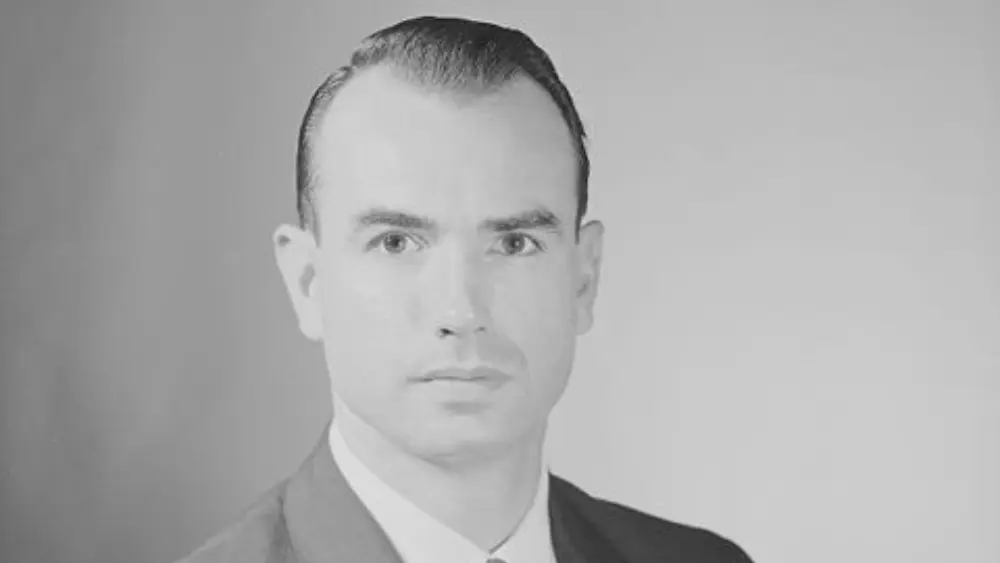G. Gordon Liddy, a multifaceted figure in American public life, carved a unique path through law, politics, and the military. Born on November 30, 1930, in Brooklyn, New York, Liddy’s life story is marked by his service in the military, a career in law enforcement, and his later involvement in politics.
Early Life and Military Service
G. Gordon Liddy’s early life laid the groundwork for a career that would span across military service, law, and politics. Born on November 30, 1930, in Brooklyn, New York, Liddy grew up in a working-class family. He pursued higher education at Fordham University, where he earned a degree in law in 1952. Following his academic achievements, Liddy embarked on a military career by joining the United States Army.
In the Army, Liddy served as an artillery officer, honing his discipline and leadership skills. His military service provided him with a foundation for the tenacity and determination that would characterize his later pursuits. While in the Army, Liddy demonstrated a commitment to duty and discipline, qualities that would become hallmarks of his multifaceted career. The experiences gained during his early life and military service contributed to shaping Liddy’s character and setting the stage for his subsequent endeavors in law enforcement and public life.
G. Gordon Liddy: Law School and Entry into Law Enforcement
Following his military service, G. Gordon Liddy continued his education by pursuing a legal degree at Fordham University Law School. After completing his legal studies, Liddy transitioned into law enforcement. He became an assistant district attorney in Poughkeepsie, New York, where he gained practical experience in criminal prosecution and the administration of justice.
Liddy’s entry into law enforcement marked the beginning of a career dedicated to upholding the principles of the legal system. His role as an assistant district attorney reflected his commitment to justice and public service. The experiences gained during this period would later contribute to shaping Liddy’s approach to law and order as he transitioned into other roles in government and public life.
FBI and Early Political Involvement
G. Gordon Liddy’s career took a federal turn when he joined the Federal Bureau of Investigation (FBI), marking a significant chapter in his law enforcement journey. As an FBI agent, Liddy focused on various assignments related to criminal investigations and counterintelligence, showcasing his dedication to national security and the enforcement of federal laws. His time with the FBI provided him with a comprehensive understanding of federal law enforcement procedures and the complexities of navigating the legal landscape.
Liddy’s early political involvement coincided with Richard Nixon’s presidential campaign, where he played a role in organizing student support. This period marked the beginning of Liddy’s entry into the realm of political engagement. His enthusiasm for political activities grew, and he became increasingly involved in conservative circles, aligning himself with the ideology and policies of the Nixon administration. These early forays into politics laid the groundwork for Liddy’s later involvement in high-profile political events and his association with the Watergate scandal.
G. Gordon Liddy: Influential Role in the Watergate Scandal
G. Gordon Liddy’s notoriety reached its peak when he became a central figure in the Watergate scandal, one of the most influential political events in American history. Liddy, along with other members of the Nixon administration’s Committee to Re-elect the President (CRP), orchestrated the break-in at the Democratic National Committee headquarters in the Watergate complex. The covert operation aimed to gather intelligence on political rivals and undermine the Democratic Party during the 1972 presidential election. However, the break-in was discovered, leading to a series of investigations that ultimately exposed a web of illegal activities, cover-ups, and abuses of power within the Nixon administration.
The repercussions of the Watergate scandal had a profound impact on G. Gordon Liddy’s life and reputation. He was convicted of conspiracy, burglary, and illegal wiretapping, among other charges, and subsequently sentenced to more than four years in prison. The scandal not only led to Liddy’s imprisonment but also contributed to the resignation of President Richard Nixon in 1974, marking a significant moment in American political history. Liddy’s role in Watergate and the subsequent legal consequences shaped the narrative of his legacy, making him a symbol of the ethical challenges and consequences associated with political machinations and abuses of power.
Prison Sentence and Later Years
G. Gordon Liddy’s deep involvement in the Watergate scandal resulted in a prison sentence. Convicted of conspiracy, burglary, and illegal wiretapping, among other charges, Liddy faced the legal consequences of his actions. In 1973, he began serving a sentence of more than four years, during which time he became a symbol of the ethical challenges and repercussions associated with political scandals.
However, after his release from prison, G. Gordon Liddy embarked on a surprising reinvention. Instead of fading into obscurity, he transitioned into the realm of media, becoming a radio talk show host and author. Liddy used his experiences, including his role in Watergate and his time in prison, to provide commentary on law, politics, and personal development. Despite the controversy surrounding his past, he found a platform for sharing his perspectives, engaging with audiences, and offering insights based on his unique life journey. Liddy’s later years demonstrated a resilience that allowed him to transcend the notoriety of Watergate, carving out a new identity as a commentator and author in the public sphere.
G. Gordon Liddy: Authorship and Radio Career
In his later years, G. Gordon Liddy delved into authorship, penning several books that provided his unique perspective on the events that had defined his unruly life, including his role in the Watergate scandal and his experiences in prison. These books served as a platform for Liddy to offer his insights, reflections, and, at times, a defense of his actions. Through his writings, he engaged with readers, inviting them to navigate the complex narratives surrounding his life and the historical events in which he played a pivotal role.
Simultaneously, Liddy found success in the world of radio, where he hosted a talk show that allowed him to connect directly with listeners. His radio career became a significant chapter in his post-Watergate life, providing a platform to discuss and analyze a wide range of topics, from politics to personal development. Liddy’s ability to reinvent himself as an author and radio personality showcased a resilience that transcended the controversies of his past, allowing him to remain a relevant and active figure in public discourse even after the turbulent chapters of Watergate had concluded.
Controversies and Legacy
G. Gordon Liddy’s legacy is undeniably complex, reflecting a mix of achievements and controversies that have left a lasting imprint on American political history. On the one hand, some admire Liddy’s resilience in overcoming the notoriety of the Watergate scandal and his ability to reinvent himself as an author and radio personality. His contributions to public discourse, albeit controversial, allowed him to remain a relevant figure in discussions on law, politics, and personal development.
On the other hand, G. Gordon Liddy’s legacy is marred by his central role in the Watergate scandal, a significant breach of trust that shook the foundations of American democracy. His involvement in illegal activities, including the break-in at the Democratic National Committee headquarters, and a willingness to disregard ethical boundaries for political gain have drawn criticism. The controversies surrounding Liddy’s actions during Watergate and the subsequent legal consequences contribute to a mixed legacy, reminding us of the ethical challenges and consequences associated with political machinations and abuses of power. His life story serves as a cautionary tale about the potential consequences of overzealous political ambition and the importance of upholding ethical standards in public service.

G. Gordon Liddy: Political Philosophy and Ideological Stance
Throughout his public life, G. Gordon Liddy was known for his staunch conservative views, which he openly expressed through various mediums, such as his radio show and writings. Liddy’s political philosophy reflected a commitment to principles associated with conservative ideology, including a belief in limited government, individual liberties, and a strong national defense. His outspoken advocacy for conservative values became a defining aspect of his public persona, contributing to his identity as a prominent figure within conservative circles.
Liddy’s ideological stance often aligned with traditional conservative positions on issues such as law and order, national security, and personal responsibility. Through his radio career and writings, he engaged with audiences, disseminating his perspectives on these topics and contributing to the broader conservative discourse in the United States. While some admired Liddy for his unapologetic commitment to conservative principles, others criticized him for what they perceived as an uncompromising and, at times, controversial approach to political commentary. G. Gordon Liddy’s political philosophy remains an integral part of his legacy, reflecting the diversity of political thought and ideological perspectives within the American political landscape.










